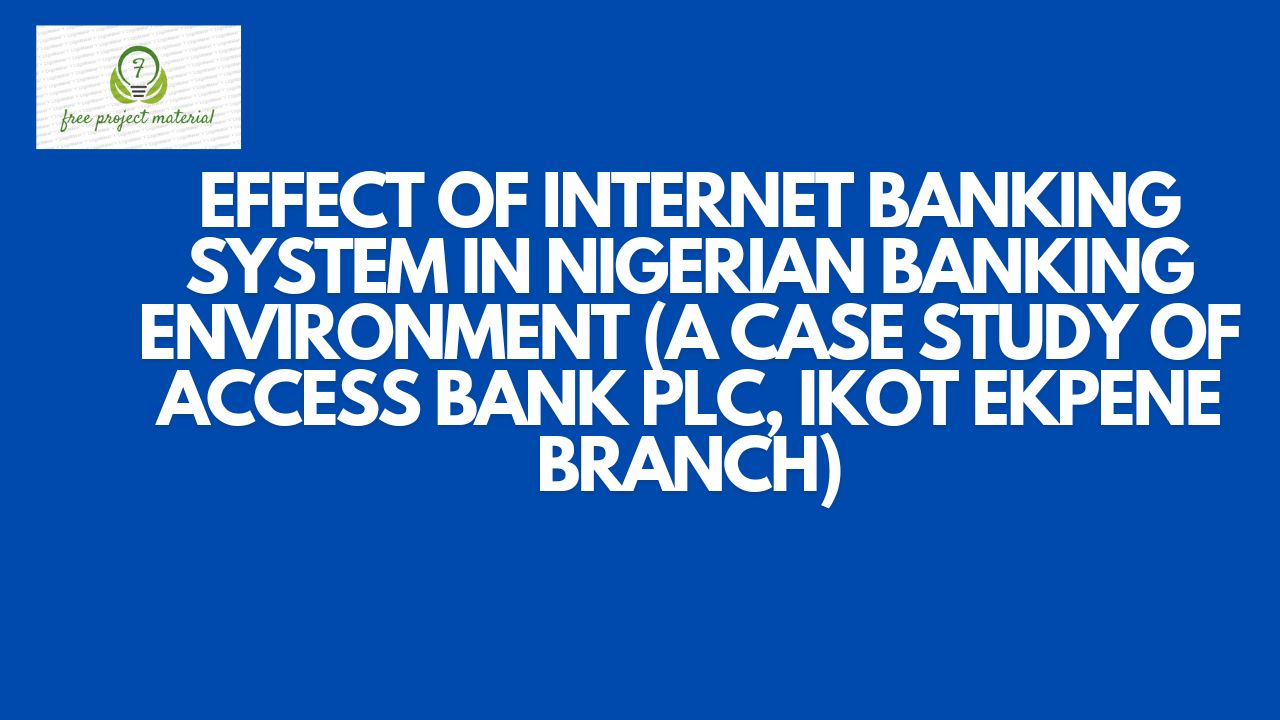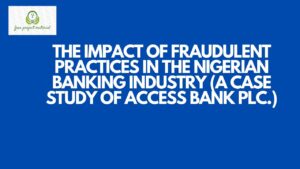ABSTRACT
This study on effect of internet banking system in Nigerian banking environment (a case study of Access Bank Plc. Ikot Ekpene Branch) aimed to examine the effect of internet banking on the Nigerian banking system. To achieve the research objectives, the study made use of survey research design. Taro Yamane formular was used to select thirty-six (36) respondents as sample size for the study. The instrument of data collection was self- developed questionnaire and the forms were personally administered. The data obtained were analyzed using simple percentages and tables. The findings of this study revealed that; the prospect of internet banking in Nigeria’s banking environment includes ease of file management, improves speed of service delivery and enhances flexibility; Internet banking has tremendously improved bank operations in Nigeria; Nigerian banks are partially computerized; Introduction of internet banking has greatly improved bank performance in Nigeria; The digital financial services or product that exist in the Nigerian financial market includes online banking apps, credit and debit cards and POS. Therefore, it is recommended that Bank customers should be educated effectively on the need to adopt and utilize internet banking services/products as well as how to utilize the internet banking products/services. Also, banks should ensure adequate security in the operations of internet banking products.
LIST OF TABLES
Pages
Table 4.2.1: Responses to Research Question One – – 37
Table 4.2.2: Responses to Research Question Two – – 38
Table 4.2.3: Responses to Research Question Three – – 39
Table 4.2.4: Responses to Research Question Four – – 40
Table 4.2.5: Responses to Research Question Five – – 41
TABLE OF CONTENTS
PAGES
Title Page – – – – – – – – i
Declaration – – – – – – – – – ii
Certification – – – – – – – – – iii
Dedication – – – – – – – – – iv
Acknowledgements – – – – – – – v
Abstract – – – – – – – – – vi
List of Tables – – – – – – – – vii
Table of Contents – – – – – – – – viii
CHAPTER ONE
INTRODUCTION
1.1 Background of the Study – – – – – – 1
1.2 Statement of the Problem – – – – – – 3
1.3 Objectives of the Study – – – – – – 6
1.4 Research Questions – – – – – – 7
1.5 Significance of the Study – – – – – 8
1.6 Scope and Limitations of the Study – – – – 8
1.7 Organization of the Study – – – – – 9
1.8 Definition of Terms – – – – – – 9
CHAPTER TWO
REVIEW OF RELATED LITERATURE
2.1 Conceptual Framework – – – – – – 11
2.1.1 Major Classes of Internet banking – – – – 11
2.1.2 Cyber-Crimes Threats on the Nigerian Banking Premises – 12
2.1.3 Importance of Internet Banking – – – – – 12
2.1.4 Development of Electronic Banking – – – – 14
2.1.5 The Challenges and Limitations of E-banking – – – 16
2.2 Theoretical Framework – – – – – – 18
2.2.1 Technology Acceptance Theory – – – – – 18
2.2.2 The Theory Reasoned Action – – – – – 19
2.3 Empirical Review – – – – – – – 20
2.4 Summary of Related Literature – – – – – 24
2.5 Research Gap – – – – – – – 26
CHAPTER THREE
RESEARCH METHODOLOGY
3.1 Research Design – – – – – – – 27
3.2 Area of the Study – – – – – – – 27
3.3 Population of the Study – – – – – – 27
3.4 Sample and Sampling Techniques – – – – 27
3.5 Source and Nature of Data – – – – – 28
3.7 Method of Data Collection/Instrumentation
3.8 Empirical Specification of model – – – – 29
3.9 Ethical Issues – – – – – – – 30
CHAPTER FOUR
DATA PRESENTATION, ANALYSIS AND INTERPRETATION
4.1 Presentation of Data – – – – – – 32
4.2 Analysis of Research Questions – – – – – 36
4.3 Discussion of Findings – – – – – – 42
CHAPTER FIVE
SUMMARY, CONCLUSION AND RECOMMENDATIONS
5.1 Summary – – – – – – – – 44
5.2 Conclusion – – – – – – – – 44
5.3 Recommendation – – – – – – – 45
5.4 Implication of Findings – – – – – – 46
5.5 Contribution to knowledge – – – – – 46
5.6 Suggestion for Further Study – – – – – 46
References
CHAPTER ONE
INTRODUCTION
1.1 BACKGROUND OF STUDY
The coming into existence of the internet has helped to greatly improve the operations of commercial banks in Nigeria, however, usage of electronic means to provide business services to consumers has been going on for years now. The internet facility is fast spreading globally now and it allows customers to use computers or any of their internet enabled devices to access account-specific information and possibly conduct transactions from remote location such as at home quickly and successfully. Among these devices are: Debit cards, credit cards and ATM cards which seem to make life very easy because without them, today’s life will be full of misery. In recent times, retail banks are now offering their services mostly through their internet branches. Internet banking is simply an electronic payment system which helps customers of any financial institution or bank to conduct any transaction with the help of internet enabled electronic device.
In Nigeria, the banking industry has witnessed tremendous demand increase and lots of challenges due to increase in the awareness and utilization of internet banking services. The increasing demand for bank services have equally increased the staff strength and branches of most Nigerian banks. In spite of these increases in staff strength and branches, the banks still find it difficult to satisfy the demands for some of their services because some of their transactions are based on manual and physical presence of their customers. The introduction of Internet banking is intended to provide relief to the increasing volume and complexity of banking operations and services delivery of the modern times. Experimentation with Internet banking and electronic fund transfer is gradually becoming part of daily transaction as arrangements are made with banks using internet enabled microcomputer to pay some bills owed big department stores and companies. With these practices, the internet has become a service delivery mechanism and their customers have equally embraced it. Hence, information technology through Internet banking is radically changing how banking is done all over the world and Nigeria can not be an exception (Abbas and Cross, 2019).
The volume and speed of banking transactions has improved tremendously as a result of the growth of internet banking which has created a lot of changes and business opportunities for banks, Corporate bodies and industries. Infact Nigeria is believed to be the largest Internet user in West African with about 100,000 Internet users as at year 2000. It was estimated to have risen to 350,000 in 2001 and projected to hit a million by the end of 2002 However, the population size of Nigeria calls for accelerated sensitization on the need to embrace information technology and the provision of an enabling environment for its operation. Internet is inevitable for the success of any modern banking operation since it is a competitive tool as it creates room for customized services and reduces the cost of operation, promotes profitability growth and efficient portfolio management. The emergence of a crop of new generation banks coupled with computerization of the Nigerian financial sector motivated the introduction of high technology in the Nigerian banking system. Virtually every Nigerian bank claims to have internet banking and on-line service provision. Indeed internet banking has brought a greater advantages for one bank over another depending on its application, operation and service delivery (Abbas and Cross, 2019).
1.2 Statement of Problems
Internet technology holds the potential to fundamentally change banks and the banking industry. An extreme view speculates that the internet will destroy old models of how bank services are developed and delivered DeYoung (2001). The widespread availability of internet banking is expected to affect the mixture of financial services produced by these banks. In addition, industry analysis outlining the potential impact of internet banking on cost savings, revenue growth and risk profile of the banks have also generated considerable interest and speculation about the impact of the information technology on the banking industry.
Banks since the inception of the use of Internet banking products in the late 1980’s have not made their presence felt much. These are as a result of problems associated with the use of Internet banking which include the following:
Nigeria’s poor Infrastructures: The first major challenge for the future of Internet banking is Nigerian’s poor infrastructure. Word Bank (2020) indicates that in Nigeria there are only 6 computers and 4 mainline telephone lines per thousand people. Also, electricity supply is sporadic and inefficient. Most importantly, Nigeria has very low Internet penetration, with less than one Internet services provided per thousand people and only an estimated 30,000 Internet users out of over 100 million people. In addition, Internet bandwidth is negligible when compared with more developed nations as there has been insufficient deregulation of the telecommunications sector to allow for investors to provide bandwidth and sell commercially. Finally, many of the areas crucial to the financial sector such as the clearing and trade processes are not automated which limits the efficiency of internet banking in this country.
Lack of security: The second challenge for the future of Internet banking in Nigeria is the issue of security. Resent research carried out in Africa by Agwu and Carter (2014) shows that companies attribute the biggest obstacle to using the Internet for financial transaction to lack of security. Many companies are concerned about the integrity of financial information that travels over the internet and would rather accept the inefficiencies and incontinences of a manual system than subject themselves to the uncertainty of the internet. In addition, Nigeria is a cash dependent economy and the issue of trust is such that even cheques are not generally accepted as payment for goods and services rendered. Recently, the Nigerian market has witnessed the development of electronic purse products such as value card and the smart pay card, designed to move the economy to electronic banking based economy although it is hoped that they will eventually help lessen the importance of cash in our society. It is therefore clear that in such an environment, most consumers will be skeptical that a click on a computer screen will result in a completed financial transaction.
Cost of ownership and Adoption: Internet banking is very expensive because it entails the acquisition of computers and telecommunication gadgets. Banks spend a lot on these products because of the exchange rate between the Naira and the dollar.
- Poor orientation (illiteracy): So many people are still ignorant of the services and benefits available to them through the use of Internet banking products. The benefits include that it is fast, safe and reliable. Thus, this study seeks to determine the effects of Internet banking on the Nigerian Banking Environment.
1.3 Objectives of Research
- To evaluate the prospects of internet banking in Nigerian banking environment
- To ascertain if the use of Internet banking has helped to improve bank operations in Nigeria
- To determine if banks in Nigeria are fully computerized or not
- To ascertain if there has been improvements in the performance of Nigerian banking industry since the introduction of Internet banking
- To ascertain the current digital financial product and services available in Nigerian financial sector
1.4 Research Questions
- What are the prospects of internet banking in Nigerian banking environment?
- Has the use of Internet banking helped to improve bank operations in Nigeria?
- Are Nigerian banks fully or partially computerized?
- Has the performance of banks improved since the introduction of Internet banking in Nigeria?
- What digital financial services or products exist in the Nigerian financial market?
1.5 Significance of Study
The purpose of this research is to identify the effects internet banking have exerted on the banking industry since its inception. It would also identify the various uses and also new technologies introduced into banks in the late twentieth century which will enhance the small banks in the industry to foster growth.
This study will serve as a source of information to banks and other financial institutions on the need for the full adoption of internet banking and other digital banking services in Nigeria.
This study will also serve as a source of information to students and the general public on the importance of internet services provided by banks. It will also serve as a reference material for student and researchers in related area of study.
1.6 Scope and Limitation of the Study
The scope of this research work will be limited to the Nigerian commercial banks and in particular Access Bank Plc Ikot Ekpene branch.
During the conduct of this research work, some factors posed as constraints to the determined the effort of the researcher to carry out the research study to such a depth and in such a manner that it ought to have been carried out judging from its relevance to management, such factors include:
Reluctance of respondents to give attention and provide answers to the questionnaire forms.
Time Constraint: Time is also another factor that acted as hindrance to carrying out this research study. This is as a result of the fact that other things were still being attended to in the course of carrying out this research work.
1.7 Organization of the Study
The study is organized into five chapters; chapter one is the introduction and this include: background of the study, research questions, scope of the study, organization of the study and definition of the terms.
Chapter two deals with the reviews of related literature on the subject matter that is the contribution of scholars and authors on the subject matter.
Chapter three describes the researcher methodology which include: research design, areas of the study, population of the study, sample and sampling techniques, source and nature of data, method of data collection/instrumentation, empirical specification of model and ethical issues.
Chapter four is concerned with data presentation, analysis and interpretation.
Chapter five gives the summary of findings conclusion and recommendation.
1.8 Definition of Terms
Internet Banking: A quick and easy way to access an account through the Internet.
Information Technology: The study and the use of electronic processes and equipment to store information of all kinds, including words, numbers, pictures.
Wide Area Network: Wide area network is a system in which computers in different places are connected, usually over a large area.
Local Area Network: Local area network is for communication by computer within a large building
On-Line: Controlled by or connected to a computer or to the Internet.
HYPER LINK: A place in electronic documents on a computer that link to another electronic document.
Website: Where accompany has information about itself on the web.
Access: To open a computer file in order to get or add information.
Search Engine: An act of looking for information in a computer database or network.
Network: Computing a number of computers and other devices that are connected together so hat equipment and information can be shared, the office network allows users to share files and software.



